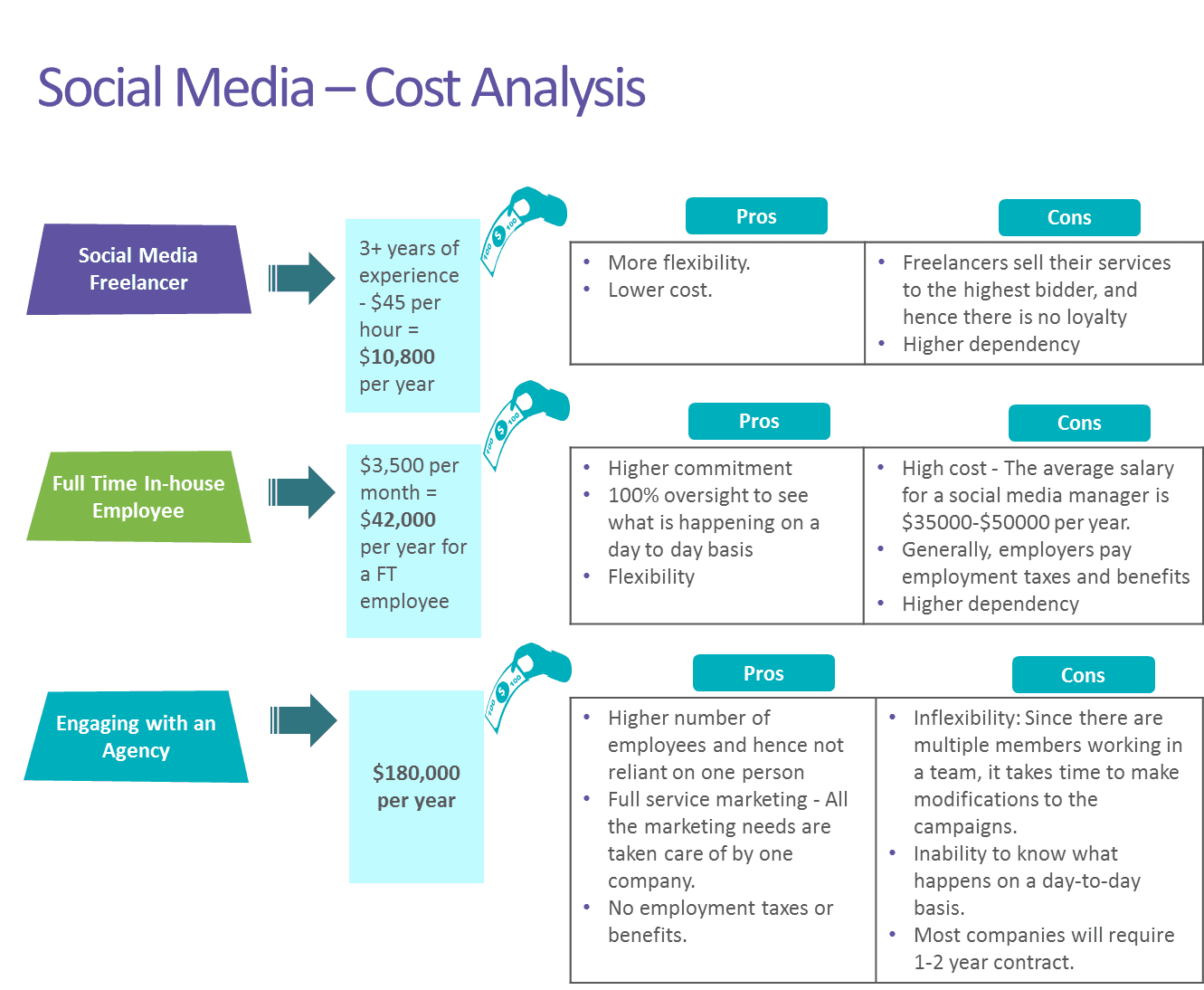
Social Media service providers: addressing the problem of plenty

Abstract
Digital marketing spend across industry sectors has been steadily increasing from $503 (2015), riding on predictions, to $663 (2018), with social media contributing to almost 13–15 percent of the overall spend. According to the CNBC, social media advertising is witnessing a Y-O-Y growth of 20 percent and will be worth $50.2 billion as against $50.7 billion by 2019. This is mainly due to the increased adoption of technology by the public. Marketers have been using social media to target their audience effectively. The current supply market for social media management is very dynamic and diversified. There are a lot of agencies that claim to provide social media services.
This whitepaper evaluates the options available to a buyer to source social media services and conducts a detailed comparative analysis of each approach.
Introduction
Digital channels contribute to almost 50 percent of the global advertising spend and have witnessed a tremendous influx in the last few years, thereby becoming the most accessible medium of communication. The time spent by viewers on digital mediums, such as desktop and mobile, is driving companies across industries to increase their digital spend. According to Hootsuite, social media currently has close to 2.78 billion users globally, out of which almost 2.5 billion users access social media through mobile phones. Facebook and Whatsapp are the most prefered user platforms where maximum time is being spent. These channels ensure that marketers have a visual presence, and thereby have a better brand reach.
Ground Level Realities:
Social media buying is highly fragmented, with all the suppliers including creative agencies, media agencies, PR agencies, digital agencies, and specialist players claiming to deliver superior results. Many companies, such as General Mills, have also started their in-house social media management teams to manage their social media pages.
Issues Arising Out of Fragmented Social Media Buying :
- Lack of clarity on channel spendings: A host of procurement managers find it difficult to identify the agencies that offer social media services . This ambiguity in the role played by the agencies leads companies to pay multiple suppliers for procuring the same service.
- Distortion of Communication: With multiple parties managing different aspects of a client’s social media account, there is a lack of uniformity in communication. This leads to complex issues in managing the brand image.
- High cost of engaging with multiple suppliers: Engaging multiple suppliers for availing the same service makes it an expensive affair for the buyers as they have to incur multiple agency fees to avail the same service.
Alternatives to Social Media Sourcing:
Based on the client’s spend, geographical reach, and future scope of social media marketing in social media advertising, there are three options that can be considered for sourcing social media services.
|
Option |
Advantages |
Disadvantages |
|---|---|---|
|
|
|
|
|
|
|
|
|
Cost Analysis of Each Approach:

Note: In-house costs in the above table do not include the cost of content, costs of social media staff (extra benefits), and cost of monitoring tools could be $30,000 – 80,000a year necessary to implement, track, measure and analyze effectiveness of social media campaigns etc.
Conclusion
Social media marketing can be managed in-house by buyers to ensure higher efficiency over the whole process. However, ideally, buyers should have an average monthly resource spend of $8,000 and above to set up their in-house facility because the minimum spending on social media advertising software alone amounts to nearly $5,000 to $10,000. Though the competitive advantage is higher while engaging an in-house team, buyers have better access to resources, audience, innovative and latest technologies while engaging a digital marketing agency; this is because these agencies have a specialization in this domain.
Marketers across various industries like the food, beverage and tobacco (FBT) and pharma, among others, are investing in developing in-house facilities. However, buyers should always explore various scenarios to ensure that they are following the right engagement model based on their requirement.
Analyst View
|
Scenario |
Approach |
Why So? |
|---|---|---|
|
When there is a need to procure end-to-end social media services |
Outsource to a global digital marketing firm.
|
Cost efficiency, technical and resource advantage, rich cross- industry experience, and higher audience reach. |
|
When there is a requirement for specific social media services, such as maintenance of social channels |
In-house team.
|
Better monitoring and control, low response time, and low audience reach. |
|
When there is a need for end-to-end services and the need of monitoring the campaign at each stage
|
Hybrid model is a mix of digital marketing firm services and in-house team. Industry experts recommend collaborating with a marketing agency partner for formulating marketing strategy and engaging an in-house team for executing maintenance activities |
Better monitoring and control, low response time, optimal utilization of resources and marketing budget, and scope to develop and educate in-house team comprise a long term strategy. |
Related Insights:
View All
Get more stories like this
Subscirbe for more news,updates and insights from Beroe






